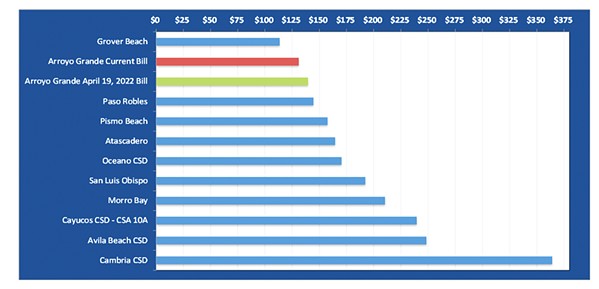[{
"name": "Ad - Medium Rectangle CC01 - 300x250",
"id": "AdMediumRectangleCC01300x250",
"class": "inlineCenter",
"insertPoint": "8",
"component": "2963441",
"requiredCountToDisplay": "12"
},{
"name": "Ad - Medium Rectangle LC01 - 300x250",
"id": "AdMediumRectangleCC01300x250",
"class": "inlineCenter",
"insertPoint": "18",
"component": "2963441",
"requiredCountToDisplay": "22"
},{
"name": "Ad - Medium Rectangle LC09 - 300x250",
"id": "AdMediumRectangleLC09300x250",
"class": "inlineCenter",
"insertPoint": "28",
"component": "3252660",
"requiredCountToDisplay": "32"
}]
For the first time in more than a decade, Arroyo Grande residents could have lighter wallets due to increased water bills.
On Jan. 11, the Arroyo Grande City Council unanimously approved a price hike to help boost water and wastewater revenues to alleviate the continual cost of providing these services to residents. The city set rates based on a report called the Water and Wastewater Rate Study. City officials said it's a much-needed update to a 2009 water study.
Arroyo Grande City Manager Whitney McDonald said that water and wastewater revenues are stored independently in two enterprise funds. These reserves are also separate from the city's general fund. Increasing water bills would also help Arroyo Grande with debt repayment.
"The city's water enterprise fund pays for a portion of the debt that was issued by the County Flood Control and Conservation District to build the Lopez Reservoir," she said. "The only other debt contemplated for the water enterprise is the potential debt service for the costs of constructing the Central Coast Blue project. That debt will not become due until after construction begins."
The rate study assessed the impact of bills with and without participating in the Central Coast Blue project—a plan to curb seawater intrusion into the Santa Maria Valley Groundwater Basin by injecting it with treated wastewater from Pismo Beach, Grover Beach, and Arroyo Grande. After a turbulent 2021, the grant-dependent Arroyo Grande is responsible for 25 percent of the $85 million project cost.
The study recommended increasing water rates by 6.4 percent this April and each Jan. 1 through 2026. For wastewater, it proposed an escalation of 8.3 percent over the same time period. Charged every other month, customers would pay an average of $8.51 more overall each billing period.
The price jumps in water and wastewater bills are expected to generate an extra $35,816 during fiscal year 2022 and $2.16 million by 2026, and $6,548 in 2022 and $407,352 by 2026, respectively.
Clayton Tuckfield of Tuckfield & Associates—Arroyo Grange's rate consultant that prepared the study—identified another need for increased water and wastewater rates.
"Back in 2013-14, the city was using about 3,500 acre-feet of water annually. As we progressed down to 2016-17, there's significant reduction in water sales to the city, which means you're not collecting as much revenue as you would have with higher water sales. It's mostly due to the state's request to reduce water consumption," Tuckfield said at the City Council meeting.
An emergency declaration triggered by extreme drought on the Central Coast prevented Arroyo Grande from receiving more water from the Lopez Reservoir, but McDonald informed New Times that the updated bills have some breathing room.
"The current rate study also evaluated possible 'drought rates' that would offset revenue losses resulting from the reduction in water usage required by the city's Stage 1 Water Shortage Emergency Declaration," she said. "The City Council has elected to proceed without the 'drought rates' at this time to reduce impacts to customers' bills."
Even with higher bills, a single-family resident using an average of 1,900 cubic feet of water in Arroyo Grande would receive some of the lowest water bills in the county, second only to Grover Beach.
Arroyo Grande residents can choose to dispute the rate increase at a Proposition 218 public hearing on March 8, but the city is anticipating cooperation.
"Very few comments or questions were raised by the public as part of those discussions. It is important that all of the city's customers be informed of the city's intent to increase their water and wastewater rates and have an opportunity to raise concerns and submit protests regarding the proposed rates," McDonald said. "Customers are invited to submit written protests of the proposed rate increases at any time before the public hearing closes." Δ
Latest in News
Comments
Showing 1-1 of 1
Readers also liked…
-

Coast Unified teachers upset over new position's salary and qualifications
Oct 20, 2022 -

SLO police identify alleged driver who hit and killed couple
Dec 22, 2022 -

When the levee breaks: Oceano residents, county officials walk a tightrope of regulations to manage Arroyo Grande Creek, which some say led to the levee's failure in January
May 18, 2023










